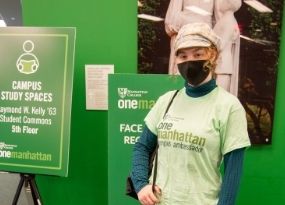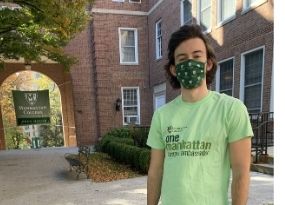One Manhattan Ambassadors Encourage Healthy Habits on Campus
During their service hours, student and employee volunteers offer face masks, hand sanitizer and reminders on the best ways to prevent the spread of COVID-19.
The COVID-19 pandemic has presented students, staff and faculty with new challenges for staying healthy during the school year.
The College’s Campus Ambassadors program is just one of the many new initiatives created through the One Manhattan Office of Campus Health and Safety, which works to implement health and safety precautions on campus.
Through the program, employees and student volunteers are stationed at highly visible locations throughout campus and are available to answer questions as well as remind the community to wear face coverings, maintain proper social distancing and adhere to other health and safety guidelines administered by the College and the Centers for Disease Control (CDC). They can provide community members with face masks, hand sanitizer and additional information as needed.
Currently there are 28 Campus Ambassadors working hard to ensure that students and faculty are following precautions and staying healthy. Here are just a few of their stories.
Interested in joining the Campus Ambassadors? Apply now.
By Madison Smith ’21
-
Kiera Jalkut ’23

Student, marketing major
As a sophomore marketing major, Kiera Jalkut knew that she wanted to make a difference on campus this year by doing her part to keep her fellow students safe.
"I made the decision to become a campus ambassador because it would get me involved in the MC community and help especially freshmen students to feel more welcomed, while also ensuring that students are helping to stop the spread of COVID," she mentions.
"I wanted to be a figure of positive encouragement rather than a person of enforcement towards the people on campus."
Part of being a campus ambassador is setting a positive example for others, and Kiera shares that students and faculty are often inspired to follow safety precautions based on her subtle actions.
My responsibilities are to act as a student example for my fellow Manhattan University students. Just the motion of adjusting my mask to the proper placement on my face sends a silent message/reminder to the surrounding Manhattan University personnel without enforcement," she says.
Overall, being a campus ambassador has been a rewarding experience for Jalkut, and she's recognized that the community at large is committed to keeping their fellow Jaspers safe.
"I found especially in the early weeks of my shifts that students and professors were very good and responsible about wearing a mask," Jalkut adds. "It was an encouraging moment for me because if we are on the right foot with COVID protective gear from the start, then the rest of the semester will go smoothly."
-
Frenki-Samuel Lulgjuraj ’24

Student, computer engineering major
Frenki-Samuel Lulgjuraj was an incoming freshman when he applied to be a campus ambassador. Since the academic year has begun, serving as an ambassador has helped him become actively involved early on in his college career.
"I chose to volunteer so I can get to know the community better but also try to make the best out of the current situation," says Lulgjuraj, who is an international student from Albania.
"The Campus Ambassadors program is making me realize the true values of the Lasallian community and what it means to be a Jasper."
Lulgjuraj's typical day as a Campus Ambassador consists of him ensuring that everyone on campus is adhering to safety guidelines, while also being a leader and a positive role model for other students.
"During my service hours I not only make sure that everyone is respecting the safety regulations on campus, which include wearing a mask, social distancing, and being mindful of one another's health, but also encouraging my fellow students to do so," he says.
A computer engineering major, Lulgjuraj also feels that he's been able to apply his strong problem solving skills to his new position as a campus ambassador.
"As an aspiring engineer, I am always trying to be an active member of the community either by solving problems or by helping others," he shares. "I chose to become an ambassador so I can help our Jasper community stay as safe as possible."
-
Nicholas Narvaez ’20

Student, education, adolescent/students with disabilities (grades 7-12) - B.S./M.S. ED major
Even as a second-semester senior graduating in December, Nicholas Narvaez felt compelled to become a Campus Ambassador in order to be a resource for students and faculty on campus during this time.
"I have a bag full of supplies to give to the MC community, which includes face masks, hand sanitizers and pamphlets that are full of information regarding Manhattan University's new policies," he says. "I have had students come up to me to ask about what some of the new policies are, and I have had other students just want to know more about the Campus Ambassadors program itself."
This past summer, Narvaez volunteered at his local Veterans Affairs (VA) Hospital to assist healthcare professionals during the pandemic, and he realized the campus ambassador program was potential for him to continue giving back.
With the VA transitioning to video tele-health appointments to keep everyone as safe as possible, the VA hospitals needed their computer servers revamped.
"I was able to work on improving the reliability of the computer networks because I was a Navy Information System Technicians (IT specialist) for four years and have experience with working on this kind of technology," he says.
Once the semester began, Narvaez learned about the Campus Ambassadors and saw a connection between its mission and his work at the VA. "I saw this as an opportunity to continue doing my part during this pandemic and help in any way I can," Narvaez says.
An adolescent and special education major with a concentration in history, Nicholas has plans to begin his teaching career in Florida. Until then, he'll be continuing his work with the Campus Ambassador program, and he is excited to continue seeing positive results.
"Manhattan University has managed to keep the number of positive cases incredibly low and has been leading by example in how to handle this unprecedented situation," he adds. "I would like to see other colleges and universities adopt policies similar to those that MC has put in place for this semester."
-
Edgar Zavala

Employee, director non-credit programs in the School of Continuing & Professional Studies
Last summer, director of non-credit programs Edgar Zavala managed the University’s Summer Day Camp, which, during the pandemic, required him to monitor COVID-19 health and safety guidelines for the children who attended. As it turns out, health and safety reminders he issued to this younger set prepared him for his role as a Campus Ambassador.
“From my experience running the day camp, when I worked with 40 families and children here at Manhattan University, I realized that the toughest part is to remind students to wear a mask and wear it properly. I envisioned that by having our degree students joining in late August, help would be needed to inform and enforce this policy,” Zavala says.
The main safety protocol Zavala has had to enforce during the fall semester continues to be mask wearing.
Fortunately, he's always prepared. If a student or employee is not wearing a mask, he offers them one with a Manhattan University shield logo. “Most of our Jaspers are aware and do the right thing. I only have had to remind a couple of students to wear their masks properly from time to time. They usually leave their nose uncovered. When they do, I point at my nose, and they immediately comply,” he says.